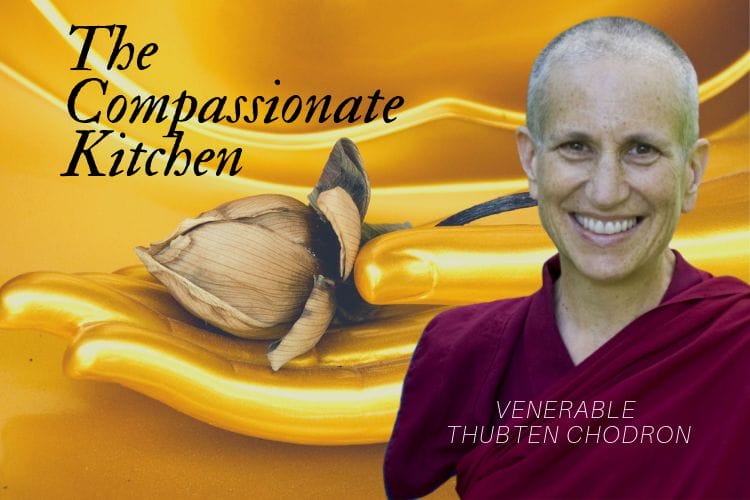Thubten Chodron: The Compassionate Kitchen

I think when you live your life like this, then people reciprocate and, at the very beginning when we first moved into the abbey, the original residents were two cats and me. And I remember sitting here as you said at the beginning of the interview. I was sitting here and wondering how in the world are we going to pay off this mortgage because I ordained when I was 26–I had never owned a house or a car. In short, everything is by donation basis.
Sandie Sedgbeer: There is a wonderful saying, virtue is its own reward, and clearly, what you’re giving out to the world, you’re getting back, and being supported, it becomes this beautiful flow, doesn’t it? You give, and others give in return. And that allows you to give more.
Venerable Thubten Chodron: Exactly.
Sandie Sedgbeer: You talk about ethical behavior and that we cannot separate the way the government operates and ethical behavior. This, of course, applies to all governments.
What we’re witnessing today in so many countries and cultures falls way, way short of being ethical. How do Buddhists respond to that? How do we, as individuals, cope with that, and what could we personally do to change it?
Venerable Thubten Chodron: Whoa, yeah. I think about this a lot. I think the first thing we need to do is as individuals get our own ethical conduct in shape because accusing people in the government of doing things that we do, that’s quite hypocritical. So, to really work on our own ethical conduct, then when we see things that are not fair, that are not just, to speak up, to say something.
It’s really our responsibility as citizens I think to speak up when the government is doing harmful things or when companies are doing harmful things. When they’re putting out products that are not tested well enough, or, in the case of the opioid crisis, advertising things that they know are addictive, to doctors and to consumers.
So, I think it’s important that we speak up about these kinds of things in the press and to, put pressure on companies. We live in this world, and we need to take care of it. And we need to take care of each other because if we don’t take care of each other, then we’re going to live in a world with a lot of unhappy people, and when other people are unhappy, they’re going to make our lives miserable.
So, the Dalai Lama says, if you want to be selfish, be wisely selfish and take care of others because if we care for others, we’re going to be a lot happier ourselves. But of course, we also want to care for others because they’re living beings and, just like us, want happiness and don’t want to suffer.
Sandie Sedgbeer: Thank you for this enlightened Interview. The Compassionate Kitchen, Buddhist Practices for Eating with Mindfulness and Gratitude by Venerable Thubten Chodron, a Shambhala Press publication.
Connect with Venerable Thubten Chodron
Connect with the Venerable Thubten Chodron at her website https://thubtenchodron.org
A veteran broadcaster, author, and media consultant, Sandie Sedgbeer brings her incisive interviewing style to a brand new series of radio programs, What Is Going OM on OMTimes Radio, showcasing the world’s leading thinkers, scientists, authors, educators and parenting experts whose ideas are at the cutting edge. A professional journalist who cut her teeth in the ultra-competitive world of British newspapers and magazines, Sandie has interviewed a wide range of personalities from authors, scientists, celebrities, spiritual teachers, and politicians.





